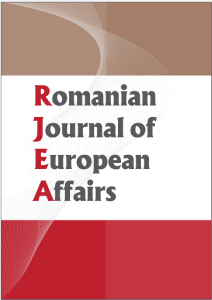In the summer issue of the Romanian Journal of European Affairs, the contributors bring forward topics related to: the EU budget negotiations for the 2014-2020 period and their impact on Romania, the EU Transfer Directive, the status of the virtual enterprise within the EU, the near-future strategic choices of Germany, and the European security and defence policy.
The Impact of EU Funds on Romanian Finances
Laurian Lungu
Abstract:
The EU budget negotiations for the 2014-2020 period are of great importance as they set political priorities for future years. As a net beneficiary of EU funds, Romania favours an increase in the size of the EU budget. Adopting such a position, however, would make little sense unless the absorption rate, which in 2012 was by far the lowest in the EU, increased at an impressive pace over the coming years. A higher EU budget would lead to an increase in Romania’s financial commitments, with annual domestic budgetary costs raising between 0.1- 0.2% of GDP. This would pose additional challenges in maintaining the Fiscal Pact’ budget ceiling.
Keywords: employment, EU budget, EU funds, finances, Fiscal Pact
The European Law regarding the Impact of Merger on Employees’ Rights
Felicia Bejan
Abstract:
The regulation of the social implications of transfers of undertakings is a topic that has made its way in the European law with quite enough difficulty, but became in time an increasingly discussed topic. Since the transfer of an undertaking from an employer to another could not be achieved with disregard of its human capital, the European legislator has established a legal framework ensuring the safeguarding of employees’ rights in the event of transfers of undertakings. Currently, the main legal basis in the field consists of Council Directive 2001/23/EC on the approximation of the laws of the Member States relating to the safeguarding of employees’ rights in the event of transfers of undertakings, businesses or parts of undertakings or businesses – the Transfer Directive. The paper aims to achieve a critical analysis of European regulations on the protection of employees’ rights in the event of transfer of undertakings as a result of a merger. The scope of the Transfer Directive, the obligation to inform and consult employees in advance and the transfer of rights and obligations arising from the contract of employment as a result of a merger are being approached. In the study, matters on which the current European legal framework requires improvements so that the achieving of its objective be possible beyond interpretation and controversy are highlighted.
Keywords: contract of employment, employees, European Law, information and consultation, merger, transfer of rights and obligations
The Virtual Enterprise – Citizen of the European Union
Andreea Davidescu (Vasile)
Abstract:
The Virtual Enterprise is a rather young and unclear concept in the business world. A virtual enterprise is a temporary network of companies that share their different resources in order to reach a given goal (the creation of a new product, or the entry on a new market) and is a powerful tool in the hands of the business community. The question this article raises is whether European Union’s businesses are able to take advantage of this opportunity within the European Union. We discuss several obstacles towards the creation of virtual enterprises: regulatory uncertainties, operational management that dismisses the advantage of an excellent infrastructure, the orientation of innovation creators towards theoretical research and the European business culture. The article also looks at research on the virtual enterprise in the European Union, the legal framework and technologies for virtualization.
Keywords: European Union, Internet, network companies, virtual enterprise
La définition progressive d’une politique européenne de sécurité
Cristian Iordan
Abstract:
This article looks upon the evolution of the idea of a European security policy, in a historical approach, based on the major challenges, statistics on defence, and some recent developments in the matter of defence budgets, but also at the European Union international identity as civilian power, normative power, or soft power.
Keywords: European Security and Defence Policy, European Union, Security
Germany: Europe’s China
Paul Dobrescu, Mălina Ciocea
Abstract:
The paper analyses Germany’s ascent not only as Europe’s most important economic power, but also as its leader. Figures show that Germany overcame the crisis; in fact the crisis legitimized its development model. Which would be Germany’s main strategic choices, confirmed by the historic evolution of the recent years? First, its option for manufacturing, which allowed Germany to turn into Europe’s factory. Second, the option for reform. “Agenda 2010”, initiated by Gerhard Schroeder in 2003, is a crucial moment in the country’s evolution. Special attention is paid to Germany’s position on the single currency. Germany’s performance is that it managed to turn the euro into a kind of European Dmark. The euro now formally “obeys” German rules, agreed upon from the very beginning, and is mainly coupled to the evolution of German economy. Germany is now sitting its most important exam: the European one. Today, Germany is Europe’s most powerful state, but it must become its leader, whose development model would be accepted throughout the continent. Some German economic options are strikingly similar to China’s.
Keywords: development model, dominant/hegemonic power, euro crisis, federal vs. national approach, German reform, strategic options






